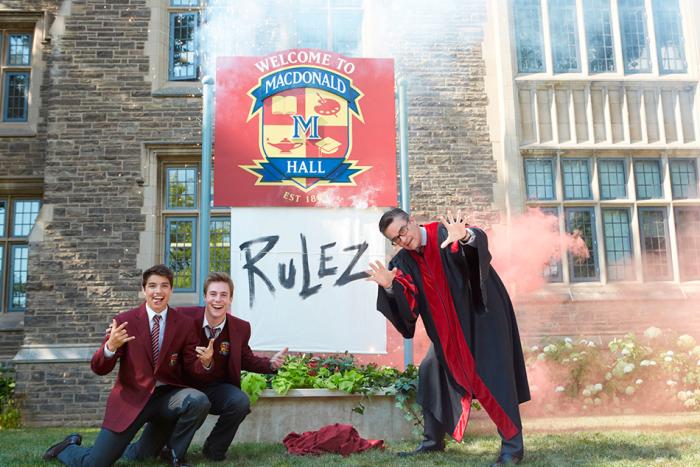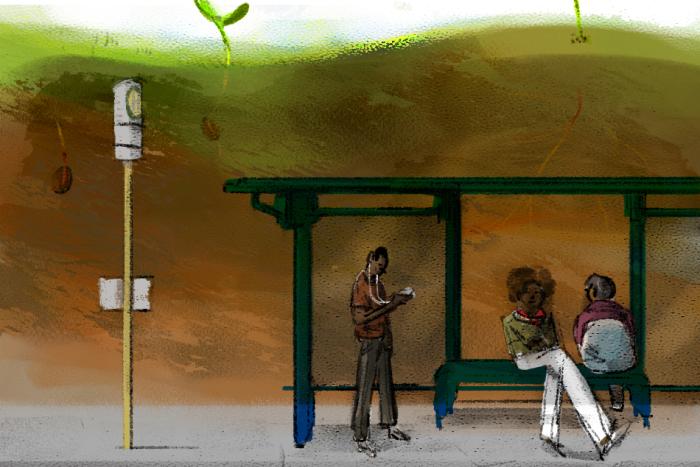It’s a straightforward act, yet it’s a slippery one. “Milkshake,” “skull-fuck,” “hummer,” or “head” all name it; likewise, you might suck a dick—or you might enjoy getting your cock sucked, or both. Opting for delicacy, you might call it “oral” or “fellatio.” But real talk: if we’re going to name the sexual act of giving pleasure to a penis by mouth, chances are we’re going to call it a “blow job.” In the kingdom of sexual slang, “blow job” reigns supreme; it’s the odd sex term that sits nearly unchallenged on its throne.
However ubiquitous, though, “blow job” is hilariously inapt. An act that rarely involves blowing and only occasional labor, “blow job” sounds like something created by a thirsty Marxist, a guy as alienated from his own pleasure as he is from his work. And as spectacularly as it fails to denote the physicality of the act, “blow job” also fails to capture both the physical act of fellatio and its joy. It’s a weird term, and, just shy of seventy years old, a relatively new one. Yet despite the youth of “blow job,” or perhaps because of it, it’s a potent term. Nothing, not even “cock sucking,” touches “blow job” for consistency and commonality.
The Oxford English Dictionary dates the entry of “blow job” to 1961 and an Anthony Hecht poem in the Hudson Review:
I have been in this bar / For close to seven days. / The dark girl over there, / For a modest dollar, lays. / And you can get a blow-job / Where other men have pissed, / In the little room that’s sacred / To the Evangelist.
Yet Hecht and the OED were late to the blow-job game; slang lexicographer Jonathon Green dates the full term’s entry into print to 1948 in his online Green’s Dictionary of Slang (currently in beta, the subscription site should be live this summer). A McCarthy-era political comic in the anthology Tijuana Bibles depicts accused communist Whittaker Chambers telling US State Department official Alger Hiss, “You give such good blow-jobs.” Whittaker and Hiss named one another as communists in the House Un-American Activities hearings; their relationship was complicated.
Even earlier than this comic, Green’s Dictionary shows that the truncated term “blow” appears in a racially offensive 1946 limerick:
A progressive and young Eskimo/Grew tired of his squaw, and so/Slipped out of his hut/To look for a slut/Who knew the very fine art of blow.
You don’t have to be woke to recognize that the willing participants in the two cited “blow” poems feature people of color; the “dark girl” who gives blow jobs in Hecht’s poem and the man who’s searching for fellatio in the limerick suggest head wasn’t something white people performed or wanted. Slang may change, but racialized erotic projection is an ugly constant—the racist politics inherent to “interracial porn” shows how white people continue to displace uncomfortable desires onto black bodies for their own benefit, and there too blow jobs are a constant.
An evanescent thing, slang once lurked the shadows for years before it appeared in print, but one of the side effects of the digital revolution is our ability to witness slang’s real-time evolution. One June day in 2014, sixteen-year-old Kayla Newman posted a Vine in which she said her eyebrows were “on fleek.” Two months later, Ariana Grande sang the phrase. Almost two years later, “fleek”’s day has come and gone, but everyone still wants their game to be on it. Before the advent of the Internet, you picked up your slang where you got your sex education: on the street. Years—even decades—could pass before spoken slang wended its way into print, and who knows how much ancient media we lost to fires, floods, outhouses, and decay.
What does it say about us that no matter who we are, when it comes to sex slang, we’re never off the company clock?
All of which is to say that “blow job” probably circulated long before 1948—possibly in gay culture, possibly through sex work, no one knows for sure. But there are copious spurious claims about the history of “blow job.” To whit: Blow job “never lost its supposed Victorian origin, which was ‘below-job’ (cognate, if you like, with the now archaic ‘going down’),” said no one ever until Christopher Hitchens wrote it in this dubious July 2006 Vanity Fair piece. The terms in which Hitchens’s article contends the roots of “blow job” rest—“below job” or “b’low job”—appear nowhere else: not in the O.E.D., not in Green’s Dictionary, and not in any of the many slang dictionaries of the eighteenth and nineteenth centuries. (Which hasn’t stopped people from taking him at his word, verifiable or not.)
One fact that Hitchens did get right, though, is that Americans love “blow job.” We can’t get enough of it—and given the term’s physical and emotional inexactitude, it’s important to ask why. Step back and look at the panoramic landscape of sexual slang, and you see that terms tend to fall into four main categories: violence (“hit it,” “gash,” “pile-drive”); work (“lay some pipe,” “get the business,” “hand job”); play (“horizontal mambo,” “hide the salami,” “be a gorilla in a washing machine”); and food (“salad tossing,” “box lunch,” “hot beef injection”). While plenty of sex slang falls out of this taxonomy, this quartet presents a surprisingly effective method for organizing the ways in which we talk about fucking. “Blow job” hits three of these categories: violence, work, and play. Ironically for oral sex slang, it misses only food.
And it’s not just Americans: the English-speaking world at large has enjoyed a long, filthy history with “blow.” An explosion, a hard hit, or the act of producing a sound from a horn instrument, “blow” is already a versatile word, and slang takes full fucking advantage of its flexibility. “Blow” meaning “fellate” dates to 1930, but the word has been doing sexy duty for centuries. “Blow” meaning to achieve orgasm came about in 1700; “blow” meaning to bring to orgasm showed as early as 1650; and “blow” meaning fucking appeared in a 1644 edition of Mercurious Fumigosus, a weird, smutty zine-style newsletter produced by John Crouch, a Royalist journalist imprisoned during the British Interregnum. While other terms have lost their erotic luster with time, “blow” has held firm. Dudes have blown their loads only since 1993, but we’ve got more than three hundred years of people achieving orgasm with “blow.”
Sex slang through the seventeenth and eighteenth centuries was deep into play. People engaging in sexual intercourse would “dance on a rope,” “play at mumble-de-peg,” or “frisk,” while “larking” was the earliest slang term for oral sex. True, “job” as slang for fucking dates to the early sixteenth century, and both “business” and “work” to the early seventeenth, but the sheer number of play terms vastly outweigh labor terms until the early twentieth century. Then, “job” proliferates—hand, mouth, brown, finger, rim, and non-specific “sex job” grow like mushrooms in the shade of “blow job.” In modern times, sex slang is all work and decreasing play, and “blow job” leads the way towards labor.
Words, slang included, ring with psychic resonance, and “job” is not a value neutral term. Most of us do our jobs with reluctance. Sure, there’s a payoff, and there’s satisfaction in a job well done, but if we’re honest with ourselves, our jobs tend not to bring us as much joy as we’d hope. We are all thirsty Marxists, somewhat alienated from our labor and definitely wanting more. And this is the issue with the whole family of “job” sex slang. As much as violent terminology shapes our thinking and the ways in which we talk about fucking, so too do capitalist terms. It says something about our relationship to sex when we think of sex in terms of labor.
We can’t simply relegate “blow job” to the commercial heap. An interrogation of slang reveals our values, our identities, and our worldviews—and “blow job” is revelatory. Whether gay, straight, or something somewhere in between, we love “blow job” (and we’re pretty fond of finger job, lube job, and knob job), so what gives? What does it say about us that no matter who we are, when it comes to sex slang, we’re never off the company clock? Are we at such a remove from our own pleasure that we need to use work as a linguistic crutch? Or has productivity become such a preoccupation that even fucking needs a gloss of efficiency?
“Blow job” may be beloved, but it’s terrible slang. A name for fellatio, something that oxymoronically sucks pleasurably, “blow job” tells us nothing accurate about the act, and even when it’s a labor of love, “blow job” reveals uncomfortable truths about us. “Blow job” may sit on a throne, but heavy lies the head that wears the blow job crown, even among Marxists. We might slip off our corporate shackles at the end of the day, but with “blow job” and its spawn, we’re never far from work.






